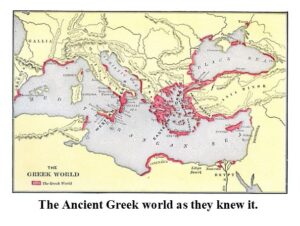
If anybody asks you, has there ever been a time when all wars stopped!
You can say yes, while the Ancient Olympics were on there was an Olympic truce and, amazingly, it was adhered to!
Yes, it was a time when all wars stopped, though it didn’t happen when the modern Olympics were being held in Paris this year.
If you think about it, it was, in fact, a very practical idea.
You see, just like today human beings have never changed, which means that in the ancient world cities and states were frequently at war with one another, just like today.
Now this meant that if you were going to arrange a festival of athletes from across the known world, they needed to find a way that those competitors and their supporters could reach the games held at Olympia, without worrying about being attacked, robbed and killed. More importantly, unlike today they couldn’t take a plane and fly over the troubles, so they had to travel through these dangerous places.
 This was a time when the Ancient Greek world stretched all around the edges of the Mediterranean, including countries such as Egypt, Italy, Cyprus, Spain, Western Turkey and the Balkans, and then there were the states to the north of Greece, such as modern Romania and Bulgaria, even into Persia. It was a vast area for people to travel in those days, in fact, even today without air travel it would take a long time.
This was a time when the Ancient Greek world stretched all around the edges of the Mediterranean, including countries such as Egypt, Italy, Cyprus, Spain, Western Turkey and the Balkans, and then there were the states to the north of Greece, such as modern Romania and Bulgaria, even into Persia. It was a vast area for people to travel in those days, in fact, even today without air travel it would take a long time.
As we said earlier, human beings have never changed, and there were always a myriad of disputes between the different states and cities, therefore we have to ask why did it work?
Well, there was one great difference that made it work.
In the ancient world they believed in their gods, they were terrified as to what would happen if they didn’t obey them. The most important one of all was the high priestess of the Temple of Apollo at Delphi known as The Pythia. The Pythia, who was in fact a woman, was known as the Oracle of Delphi.
It is thought that The Pythia was established in the 8th century BC, and in those days, it was an unspoken understanding that her prophecies came directly from the god, Apollo. The powers of the Oracle of Delphi reached their height during the 7th century BC and she continued to exercise these powers until the 4th century AD. Basically, over all these centuries the Oracle of Delphi was the most respected, significant, imposing and authoritative oracle among the Greeks. Basically, she was the most powerful women of the classical world.
Yes, the Ancient World bowed down to a woman!
The result was that as the Oracle dictated that there should be peace, that is exactly what happened every four years, there was a peace. Isn’t that amazing. In fact, the United Nations tells us that this was the longest lasting peace accord ever recorded in history.
What is interesting is that it wasn’t just for the period of the games but, as travel took so long in these days, the truce was also for the seven days before and seven days afterwards, which was, of course, to allow everyone to get home safely. Weren’t they practical?
The obvious question is, why doesn’t it happen now? Well, they tried it, but unfortunately in our modern world we don’t bow down to the Oracle, we only have the United Nations! Even so, in July 2000, we did try, the International Olympic Truce Foundation (IOTF) was created with a view to promoting peace through sport and the Olympic ideal. This led to the United Nations General Assembly, which is made up of 193 nations states, to incorporate the “Olympic Truce” into the United Nations Millennium Declaration, but did it work?
Well, Nelson Mandela was the main driver of this, and on the 19th June 2002 he launched a “Statement of World Personalities, in their Individual Capacities, in Support for the Olympic Truce”.
It was a non-binding symbolic appeal applying to all future Games, regardless of where or when they are held. Then it was officially announced during the flame-lighting ceremony for the XIX Salt Lake City Olympic Winter Games, on November 19, 2001, in Olympia.
Unfortunately, we don’t have an Oracle of Delphi any more, she went in 400 AD, and the United Nations doesn’t have the same effect, so today wars still happen during the Olympics!
 To help children learn more about The Ancient Olympics our sister site Educational Musicals has published a musical The Ancient Olympics – The Legend of Callipateira.
To help children learn more about The Ancient Olympics our sister site Educational Musicals has published a musical The Ancient Olympics – The Legend of Callipateira.
It came about when we learnt that only men were allowed to compete in the Ancient Olympics, girls and unmarried women could attend, but not married women. Odd, we thought, so we looked into Ancient Greece and found this story of a married woman, Callipateira, who wanted her son to go the Olympic Games. She put on a false beard and went, but she got so excited that the beard fell off! Well, that probably isn’t the real story but it works.
By telling this story we discover the traditions of the games, such as the Olympic Torch and the Olympic Truce. By performing this children can learn the history of the Olympics, to download it today click on The Ancient Olympics – The Legend of Callipateira.
Isn’t History interesting?
10 questions to ask on this:
- What was the significance of the Olympic Truce during Ancient Times, and why was it adhered to?
- How did the vast geographical spread of the Ancient Greek world contribute to the necessity of the Olympic Truce?
- Who was Pythia, and what role did she play in enforcing peace during the Ancient Olympics?
- How long did the Oracle of Delphi hold influence, and what made her the most powerful woman in the classical world?
- According to historical records, what dictated the period of peace during the Ancient Olympics, and what was its duration?
- Why was the Olympic Truce extended beyond the duration of the games themselves in Ancient Times?
- How does the modern attempt to replicate the Olympic Truce differ from its ancient counterpart?
- Who spearheaded the creation of the International Olympic Truce Foundation, and what was its purpose?
- What was the significance of Nelson Mandela’s involvement in promoting the Olympic Truce?
- Despite modern efforts, why do conflicts still occur during the Olympic Games today?
For more information click on:
https://www.hellenicaworld.com/Greece/Person/en/Callipateira.html
https://www.historyanswers.co.uk/ancient/oracle-of-delphi/.
© Tony Dalton

